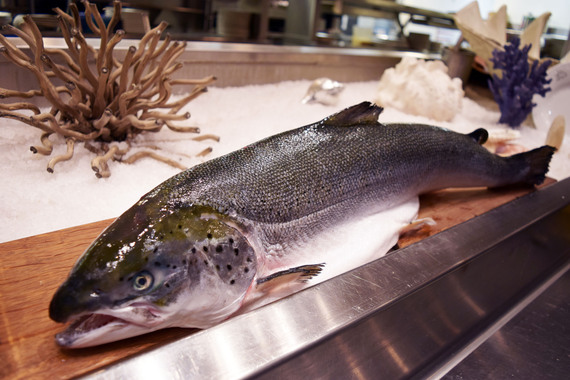
There are a lot of issues facing the food industry right now - truth in labeling, sustainability, fair trade, I could go on for days. Thanks to guys like Larry Olmsted exposing the problems in labeling, and Michael Pollan addressing what should be recognized as food - we are starting to really think about what we eat. My arena has always been seafood, what we are doing to and for our oceans. We've had an over-fishing problem for a long time, and to combat that, we've seen the rise of farm-raised fish and aquaculture. It's a great idea, but it's brought its own set of issues.
Aquaculture may be fairly new, but what many consumers don't realize is that the practice has brought its own set of dangers. Many farming processes, specifically salmon, include the same types of antibiotics and overdosing problems we've been warned about with commercially raised cattle. Crowded pens, sea lice infestations, toxic chemicals used to eradicate weed and algae growth - all symptoms of irresponsible farming practices, all present in modern day aquaculture.
 ©May Wildman
©May Wildman
While the message may be bleak, it's not all bad news. Similar to commercial cattle operations, I'm now seeing responsible, passionate, and thoughtful aquaculture operations come into their own. These types of operators, including Canada's True North Salmon, have taken a different approach, using environmentally friendly practices and vertical integration to provide our county's favorite fish in a better way. These companies have looked past profits, and are raising fish in their native environments, embracing their natural habits and using antibiotics when needed, not as a blanket or preventative solution.
Driving this positive change? I give the credit to consumers: you've asked the right questions; you care about where your food is coming from. I'm proud to be a part of a huge movement to protect our oceans, and every time a restaurant customer checks Monterrey Bay Aquarium's Seafood Watch app or site before ordering, we further that cause and that protection.
I've given my career to this cause, and to see change on a consumer level keeps me going. I encourage each and every consumer to continue until we have more responsible solutions than irresponsible ones. Keep asking questions when you dine out and at the grocery store, know which choices are responsible and which ones contribute to environmental damage - and frankly aren't good for your body.
The ball is rolling, but we can't stop now - thank you for helping me make a difference, and I won't stop if you don't.
This post is part of a series produced by The Huffington Post in partnership with Secretary of State John Kerry's Our Oceanconference and Ocean Unite, an initiative to unite and activate powerful voices for ocean-conservation action. The series is being produced to coincide with the Our Ocean Conference (September 15th, 16th) as part of HuffPost's "What's Working" initiative, putting a spotlight on initiatives around the world that are solutions oriented. To read all the posts in the series, read here. The State Department does not endorse the content of this blog. Follow the conversation on Twitter with the hashtag #OurOcean #MakeASplash.